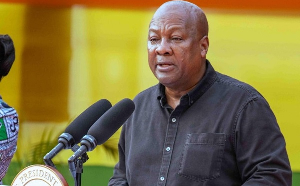ELSENKIRCHEN, Germany — Gerald Asamoah is not the first nonwhite man to play for Germany's national soccer team. But as he likes to observe, "I'm definitely the blackest."
When he trotted onto the field in Bremen during Germany's friendly match against Slovakia in May, Mr. Asamoah, 23, a naturalized German citizen originally from Ghana, became the first African-born man to represent Germany on the soccer field. He also transformed the cleareyed, light-skinned face of German soccer — and, some argue, of Germany itself.
Because this is Germany, a country whose successful soccer team is hallowed, Mr. Asamoah's blackness, magnified by his rise to the status of Nationalspieler, or player for the national team, has invigorated a national discussion about what it means to be German.
Unlike Britain and France, former colonial powers with large immigrant populations from the Caribbean and Africa, Germany has had very few famous black athletes.
Mr. Asamoah, a powerfully built attacking midfielder, said that when he was first offered the chance to play for Germany, he was not sure how to respond.
"I am proud to be the first black man to play for Germany," he said in an interview in the stadium here where his German club team, Schalke 04, plays home games. "But it wasn't easy. You have this fear that you won't be accepted, and for that reason I wasn't sure if I should even choose to play for Germany or not."
Although 9 percent of Germany's 82 million residents are noncitizens, the country has until recently rejected the notion that it could be a land of immigration rather than a country that allows foreigners — including 2.7 million Turks — to live here as "guest workers" or political refugees.
That thinking is now changing. But there is still resistance, particularly from conservatives, to diluting the homogeneous image of a German Volk.
"The team is a treasure of the nation, and it's also a symbol of how German people think about their country," said Till Briegleb, a culture columnist for Die Woche, a national weekly, who has written about Mr. Asamoah. "I think this will be a symbol for other, maybe Turkish, maybe black players who will say, `This is possible.' "
Shortly after Mr. Asamoah was born, in Mampong, Ghana, his parents emigrated to Germany, and his father found work in a Hanover tire factory. As a boy, reared in Ghana by his grandmother, Mr. Asamoah recalled, he played soccer constantly, barefoot like most Ghanaian boys. At 12, he joined his parents in Hanover.
By 1998, when he was 19, Mr. Asamoah was already a rising star and was invited to play on Germany's under-21 national team. But Ghana had also asked him to join its national team in a game against Mozambique. Urged by his father and uncertain of a black man's prospects on a German team, Mr. Asamoah chose to play for Ghana.
But Ghana eventually chose not to use him, and soon Mr. Asamoah returned to Germany, where his application for citizenship was approved in near-record time, a common practice for gifted sportsmen or other desired immigrants. In March he played on the German team's B- squad in a match against France.
"I'm from Ghana," he said. "It didn't even seem thinkable that I'd play for Germany."
He has since played in six international games.
Asked if he felt German now, Mr. Asamoah, who enjoys playing the German brand of aggressive soccer, said yes and no.
"I've been in Germany a long time, speak German and have German friends," he said. "On the other hand, to really feel German is difficult, especially as a person of color. I'm considered German, but maybe I feel that it's more like 50-50."
But he added: "I live here in Germany. I travel to Ghana only for vacation."
Mr. Asamoah is not the first nonwhite person to play for Germany, which briefly fielded Erwin Kostedde in 1974 and Jimmy Hartwig in 1979, two players whose fathers were black American servicemen stationed in Germany. Mehmet Scholl, the son of a German mother and a Turkish guest worker, is now a midfielder for the German team.
Before being named to the national team, Mr. Asamoah said, he would encounter doormen at German nightclubs who simply told him, "You're not coming in."
But on the playing field, Mr. Asamoah said, his race has never been a topic of conversation, neither among his national team colleagues nor among international opponents. "At least not when I'm standing there," he said with a guffaw.
Soccer News of Friday, 26 October 2001
Source: PAUL ZIELBAUER












